How to Lubricate RV Stabilizer Jacks: 4 Main Types Of Leveling Jacks
Are you wondering how to lubricate RV stabilizer jacks the right way? RV jacks are a necessary part of keeping your RV safe and secure while you’re out on the road. However, if they aren’t properly cared for, they won’t be able to do their job.
That’s why it’s important to know how to lubricate your RV jacks correctly. In this article, we’ll show you how to properly lubricate RV jacks so that they can continue to perform at their best.
Table of Contents
Preventative Maintenance
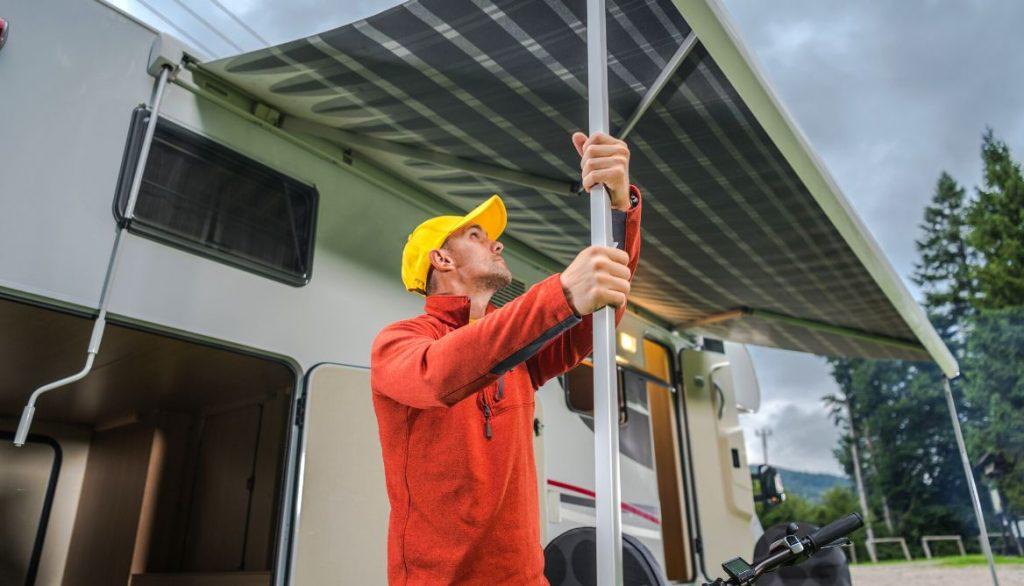
Managing your RV is an important step in ensuring a safe and enjoyable journey. While lubricating the jacks on your RV is a key part of preventative maintenance that shouldn’t be overlooked.
Not lubricating your jacks can lead to issues such as squeaky landing legs or difficulty in leveling the RV. To avoid these issues, it’s important to lubricate them regularly and consistently.
Note: Different types of jacks may require different types of lubricant, so make sure you know what kind of lubricant is appropriate for your jacks before you begin.
Where to Start
When it comes to lubricating RV jacks, you should take initiative by using the best product like Boeshield T-9. This product is superior in terms of penetration, moisture displacement, and long-lasting rust protection.
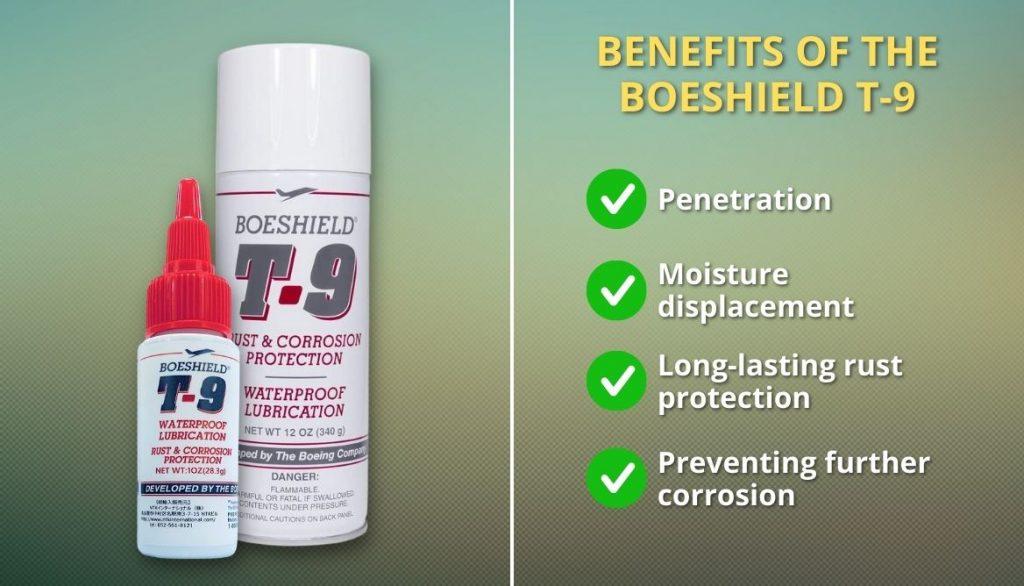
It also prevents further corrosion by displacing any moisture that could cause rusting and ensures that your jacks are well-lubricated and functioning properly.
RV Lubrication Routine
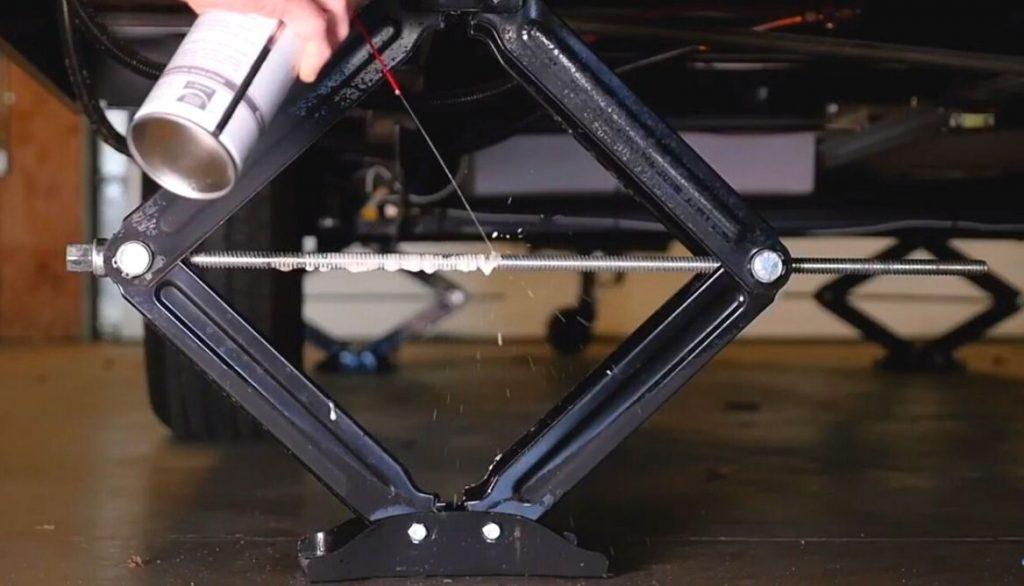
It is important to follow a regular lubrication routine for your RV. This should be done every 3-6 months depending on the amount of use. Apply a spray or lube like T-9 to remove dirt from areas such as:
- Lock cylinders
- Hinge points on steps
- Stabilizer jacks
- 5th wheel landing gear
- Slideouts
- Door hinges
- Window tracks
Attention: Before applying T-9, make sure to wipe off the areas with a rag. After applying the lube, be sure to exercise the area to ensure the lube is dispersed properly. This works great and will also help to extend the life of your RV parts a bit.
Types Of RV Leveling Jacks
1. Manual Jacks
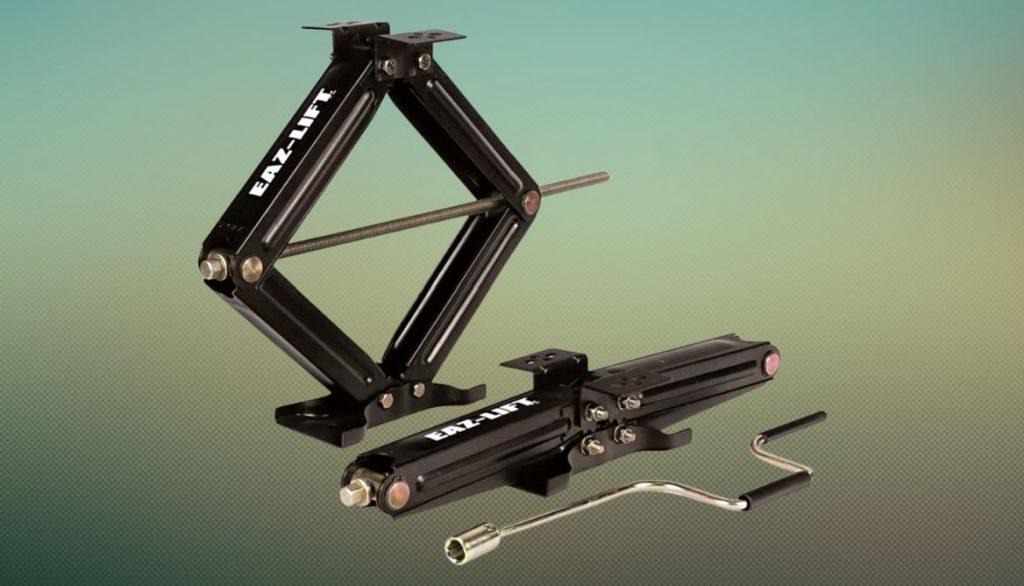
Load Capacity: | 2000 to 3000 lbs |
Price: | $50 to 70 |
Manual jacks are the most basic type of RV leveling jacks and come in a few different varieties. The most common type of manual jacks are:
- Scissor jacks
- A-frame jacks
- Aluminum stack jacks.
They are easy to maintain because they have no motor or hydraulic fluid to inspect. In addition, manual jacks are cost-effective and easy to install.
Protection
For their protection:
- It is important to inspect contact points and pivot points for damage.
- Arms should also be checked for stripped threads or loose bolts.
- Manual jacks should be lubricated a few times per year.
Lubrication
We suggest using a spray lubricant like silicone spray with built-in rust inhibitors, such as Fluid Film. This helps to reduce friction, which can prevent wear and tear over time.
Safety Measures
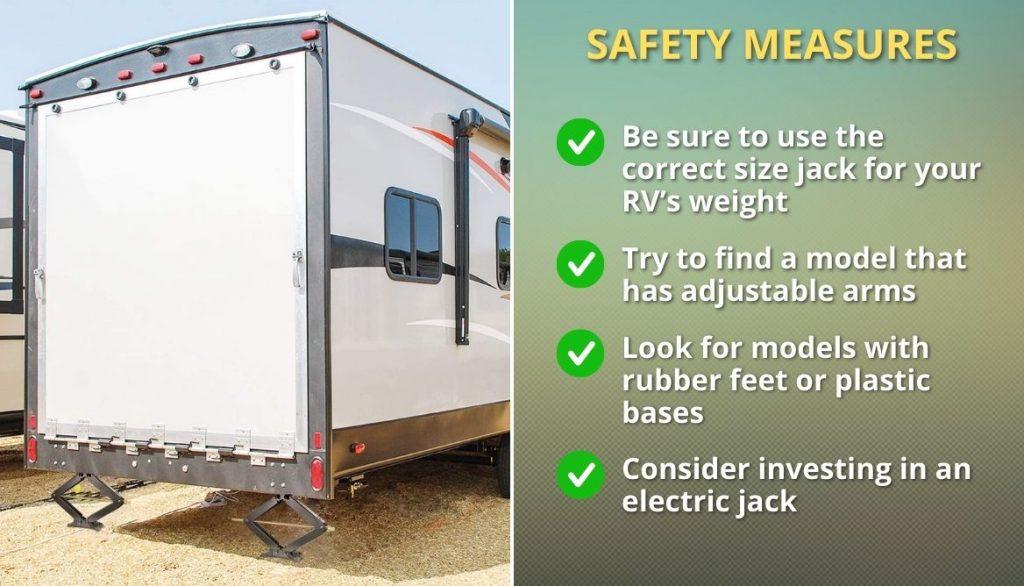
- Be sure to use the correct size jack for your RV’s weight so that you don’t put too much strain on the system.
- If possible, try to find a model that has adjustable arms, which allows you to easily adjust the height and angle of your vehicle.
- Also look for models with rubber feet or plastic bases, which will help protect your RV’s flooring.
- Finally, if you want to maximize ease and convenience, consider investing in an electric jack that can be operated via remote control.
2. Electric Jacks

Load Capacity: | 3500 lbs |
Price: | More than $200 |
Electric jacks are the most popular choice for RV leveling, offering ease and convenience. However, they do require regular maintenance to ensure smooth and safe operation.
Lubrication
Electric RV jacks are a great way to lift and level your recreational vehicle. To ensure they remain functioning properly, they must be regularly lubricated. This process involves:
- removing the jack from the vehicle
- cleaning it with a degreaser
- then applying lightweight grease to the jack’s moving parts like brake cleaner.
Note: After lubrication, the jack should be reattached and tested for proper operation.
Safety Measures
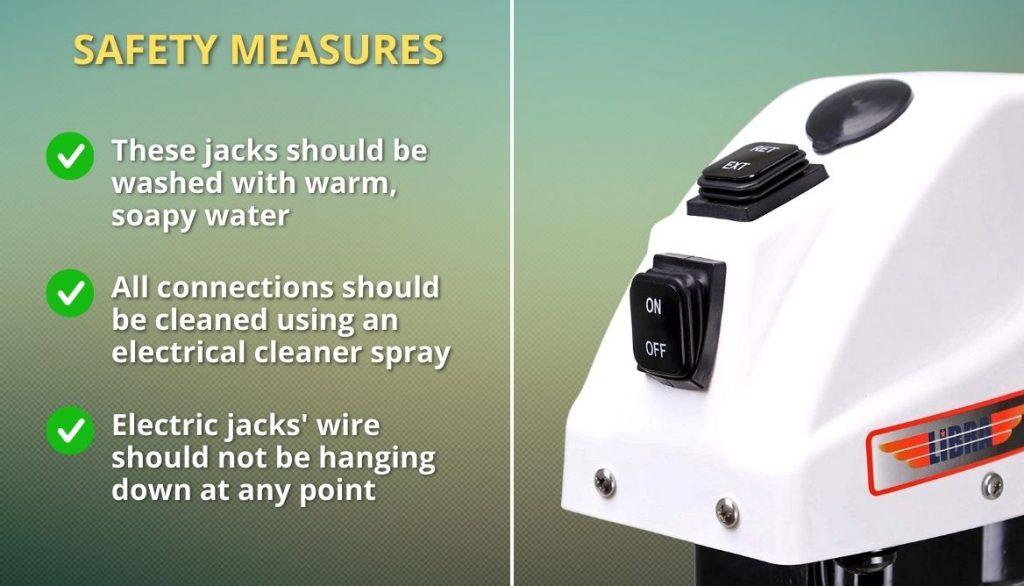
- These jacks should be washed with warm, soapy water and any rust should be sanded off.
- Additionally, a protectant spray should be used to help prevent damage to the jack’s components.
- Electric jacks’ wire should not be hanging down at any point as this can create a potential safety hazard. All connections should be examined and cleaned using an electrical cleaner spray.
Warning: Before operating the electric jacks, make sure the batteries are fully charged. With proper care and maintenance, electric jacks will ensure that your RV remains level, safe, and comfortable for years to come.
3. Hydraulic Jacks
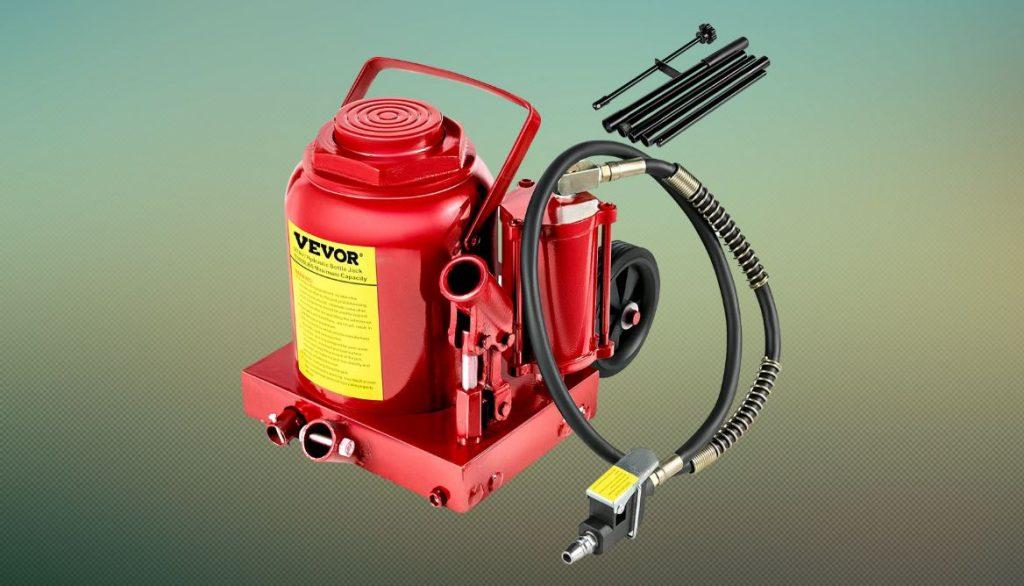
Load Capacity: | 50 to 1000 tons |
Price: | $150 to 500 |
Hydraulic jacks require more maintenance than electric jacks as each manufacturer will have different suggestions and recommendations for maintenance. Cleaning the leveler cylinder with warm, soapy water and spraying a lubricant, such as WD-40, is one way to maintain hydraulic jacks.
Safety Measures
Consider the following steps to ensure their safety:
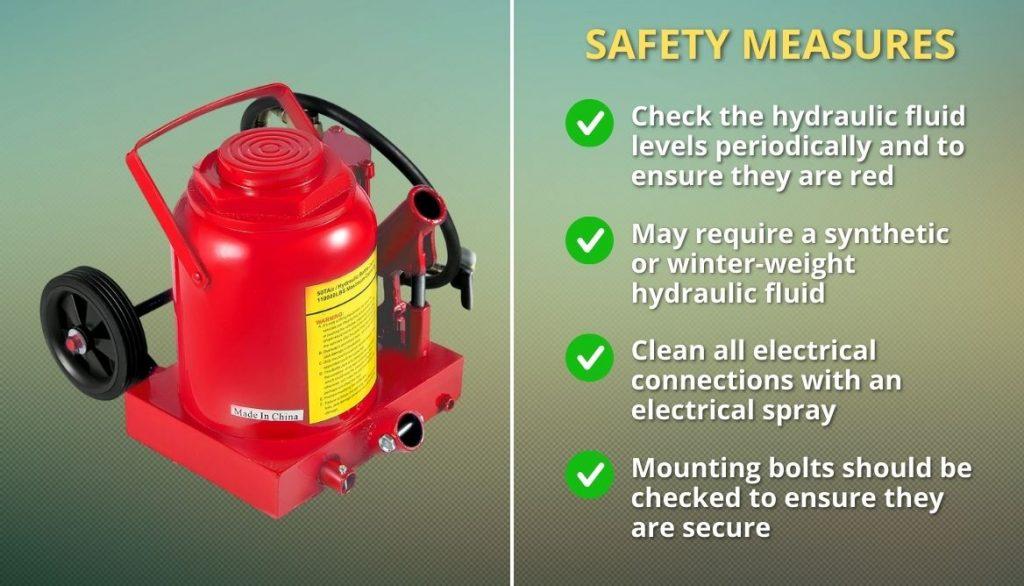
- It’s important to check the hydraulic fluid levels periodically and to ensure they are red.
- Some types of hydraulic jacks do not operate well in extremely cold temperatures and may require a synthetic or winter-weight hydraulic fluid.
- Additionally, it is important to check all electrical connections and clean them with an electrical spray.
- Lastly, mounting bolts should be checked to ensure they are secure.
Suggestion: Properly maintained hydraulic jacks can help you to keep your RV in top shape and avoid any potential problems while leveling your RV.
4. Repair Jacks
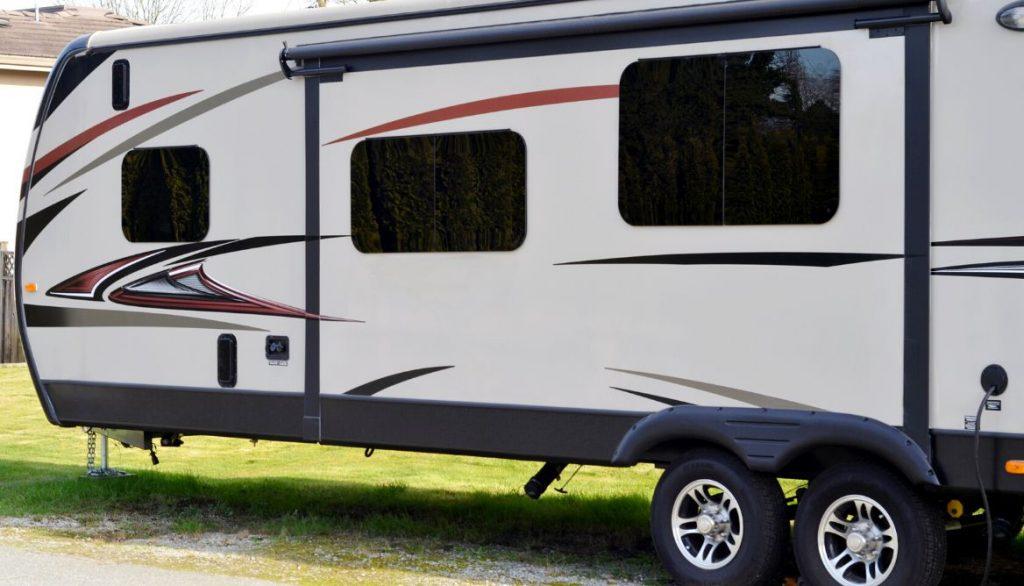
RV owners must never use damaged leveling jacks. Electric or hydraulic jacks should be taken to a professional for inspection and repair if necessary. Manual jacks may need to be replaced if they are damaged, so it is important to inspect them often.
If you take your RV out more than a few times per year or camp in areas outside of campgrounds, it may be worth considering upgrading your leveling jacks. Upgrading jacks can be a worthy investment and can save RV owners time and headaches. Look for jacks with better safety features and durability than the standard jack you may currently have.
Why Manual Jacks Are Ideal to Repair?
The manual jacks are ideal to repair because the electric and hydraulic jacks offer quick setup but do require electricity and/or oil power supplies. They will also typically require more maintenance and repair than manual jacks.
Note: Manual jacks are much less expensive than electric or hydraulic models but will require more effort from the user as all work must be done manually.
How To Lubricate RV Stabilizer Jacks
The jacks are a vital component of your RV, as they are subjected to attract dirt so they need maintenance. An essential component of maintenance is keeping them lubricated and clean.
A step-by-step guide is mentioned below:
- Care lengthens their lifespan. Therefore, inspect them before and after each journey, and clean them at least twice to four times per season.
- Start by cleaning them off with a cloth, and then rotate them 180 degrees to lubricate the jack completely.
- Grease lubricants make the surface sticky and draw dirt, thus dry lubricants like Graphite, Molybdenum disulfide, Hexagonal boron nitride, or Tungsten disulfide are ideal.
- If you’ve used grease lubrication and the dirt has accumulated, use a power washer and degreasers like Solvent-Based, Water-Based, Biodegradable, Fast-Drying, and Multi-Purpose to remove it before starting anew.
- Apply the dry lubricant to them after they are clean and dry, and then do it several more times throughout the season, especially before and after camping trips.
Tips For Proper RV Lubrication By Using A Dry Lube
Let’s take a look at some tips to lubricate your RV properly.
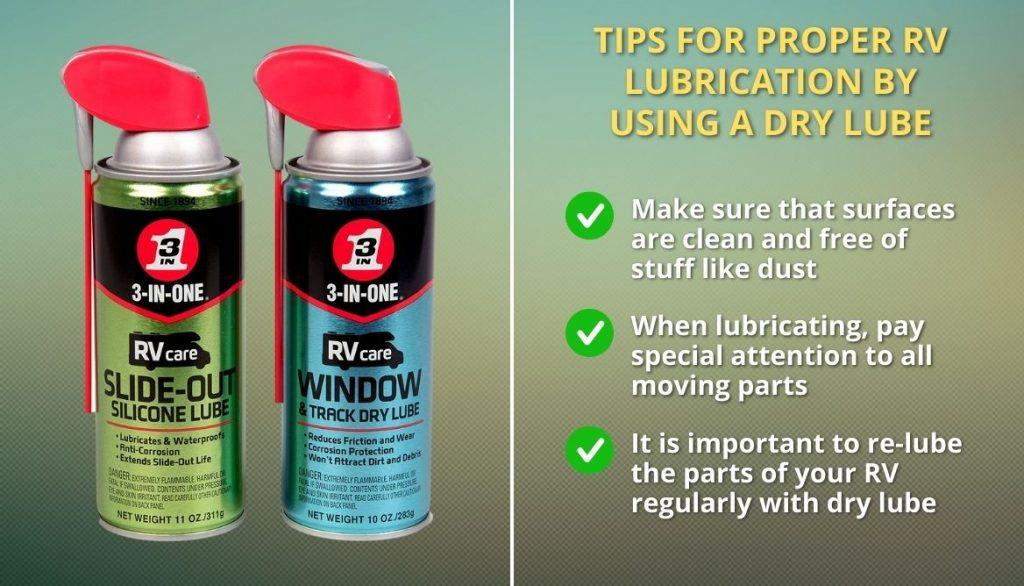
- Proper lubrication is an essential part of maintaining your RV and keeping it in top condition.
- Before you begin to lubricate any surfaces on your RV, it is important to make sure that they are clean and free of stuff like dust.
- When lubricating, make sure to pay special attention to all moving parts such as hinges, screws, 5th wheel, locks, and latches. It’s because they will attract dirt very easily.
- It is important to re-lube the parts of your RV regularly with dry lube to keep them functioning at their best.
Preventing Rust Through RV Stabilizer
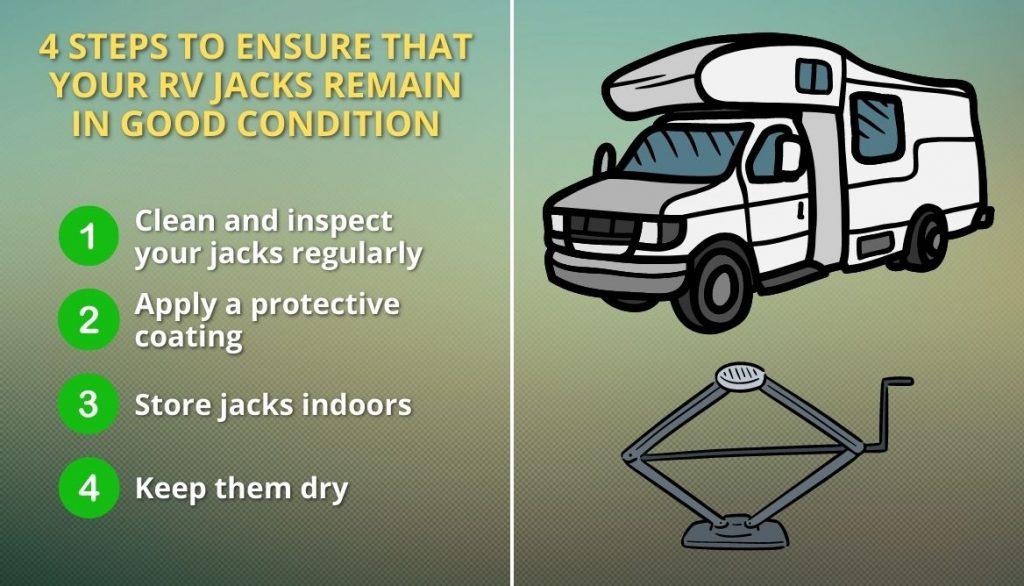
RV stabilizers are essential components of any RV, but the metal parts of these jacks can rust if they aren’t taken care of. To ensure that your RV jacks remain in good condition, it is important to take the following steps:
- Clean and inspect your jacks regularly
- Apply a protective coating
- Store jacks indoors
- Keep them dry
FAQs
What Do You Use To Lubricate RV Leveling Jacks?
RV leveling jacks can be lubricated with a variety of products, including white lithium grease, silicone-based lubricants, and motor oil.
What Is The Best Lubricant For RV Jacks?
The best lubricant for RV jacks is a multi-purpose grease specifically designed for use in wet conditions, such as Boeshield T-9.
How Do You Lubricate An RV Electric Jack?
For an electric jack, the best lubricant to use is a silicone-based long-bed lubricant like WD-40. Before lubrication, ensure that all connections and bolts are tightened properly, and then apply the lubricant along the entire length of the jack’s shaft.
What Grease To Use On A Hydraulic Jack?
When lubing hydraulic jacks, use a waterproof grease that is designed specifically for marine or automotive applications. Grease or dry graphite spray-like iso grade 32 grease with a high-quality NLGI 2 rating is recommended.
How Do I Add Oil To My RV Jack?
Add oil to the lubed RV jack by removing the plug located at the base of the jack, then pouring the recommended oil into the opening. Make sure to check your RV manual for the specific oil type and amount to use.
How Do You Maintain Jacks?
Regularly inspect, lube and lubricate your jacks to keep them in good condition. Make sure to use the correct lubricant and clean away any dirt, gunk or debris before lubrication.
Conclusion
Maintaining the proper lubrication of your RV stabilizer jacks are essential for ensuring the smooth and safe operation of your vehicle. Depending on the type of jack you have, you may need to use a specific kind of lubricant, such as silicone or petroleum-based lubricants.
Have you ever lubricated your RV jacks? What kind of lubricant did you use? Let us know in the comments!

Asen is the owner and main contributor of Camper Life. He is a full-time RV traveler since 2018. He loves camping in nature, fishing, and spending time with his family.
Striving to provide the most valuable information about campers and RVs, he shares everything he learned over the years.
That’s why Camper Life is one of the best sources to find information about RV traveling and living.






